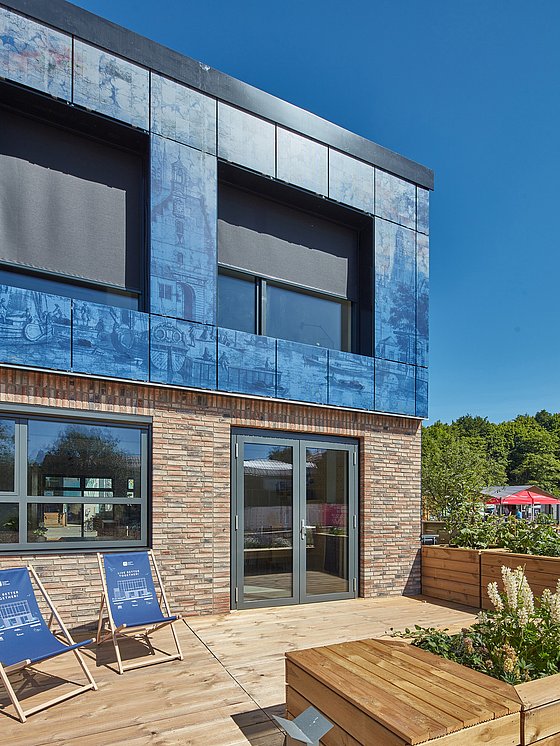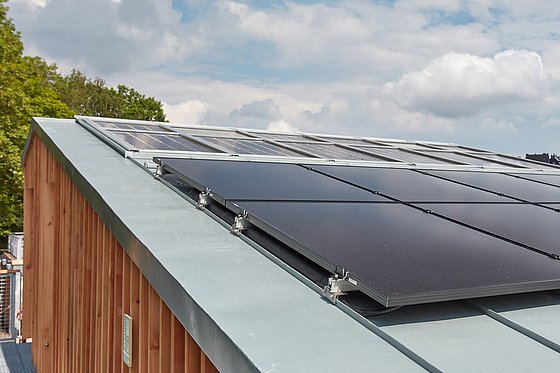Solar Decathlon Europe 21/22 goes urban!
We live in the century of cities. More and more people live in urban areas. Demand for living spaceand resources are increasing. At the same time, protecting our climate is more important than ever.The way we deal with these issues today will determine what life will look like tomorrow. That’s whywe urgently need to answer the following question: How will sustainable housing and sustainableliving in the city work?
Our struggle for global sustainability will be won or lost in cities.
Solutions for the cities of tomorrow
In Western industrialised countries, urbanisation presents the particular challenge of optimising already-existing building stock. In Germany, the population is especially increasing in mid-sized cities. For the first time, the SDE 21/22 focuses on modernising existingbuilding stock rather than on creating new buildings. With its 363,000 inhabitants, Wuppertal is the ideal venue for the SDE 21/22. The city with the suspension railway is representative of many European cities and the urban challenges they face.
The goal of the SDE 21/22 is to advance the energy transition in urban neighbourhoods against the backdrop of climate change. Funded by the Federal Ministry of Economics and Climate Action (BMWK), we are thus contributing to achieving a nearly climate-neutral building stock by 2050.

© BMWK / Dominik Butzmann
"The energetic renovation of the building stock plays an outstanding role in achieving our climate goals. It is particularly important to implement these goals in a way that is both effective and socially acceptable. As Minister for Climate Protection and Energy Transition, I therefore have great expectations for the Solar Decathlon Europe in Wuppertal.
I am very pleased that the competition is being held in Germany for the first time in its 20-year history. Be inspired and take advantage of the various opportunities to get in touch with the energy transition in the building sector."
● Dr. Robert Habeck - Federal Minister for Economic Affairs and Climate Action
Big challenges, bigger opportunities
- Cities consume almost 80 percent of global energy resources.
- Cities are responsible for 60 to 70 percent of global greenhouse gas emissions. At the same time, they are particularly affected by global warming (e.g. because of rising temperatures and heat stress, rising sea levels, storm tides, and extreme weather events).
- Growing numbers of inhabitants are met by a decreasing availability of affordable living space. Until 2030, 250 million new housing units need to be built in the twelve countries that are home to more than 61 percent of the entire global population.
Our goal: to develop the technical, architectural and social solutions for the European cities of tomorrow.
Building the housing of the future

Addition of storey by Team SUM © Sigurd Steinprinz / BUW
Our motto is therefore to convert and expand rather than to demolish and reconstruct. Improvingthe energy efficiency of existing buildings has less environmental impact than constructing comparable buildings from scratch. This is because the construction industry contributes significantly to resource and energy consumption. It is responsible for about 30 percent of global CO₂ emissions and 40 percent of overall resource consumption.
The teams of the SDE 21/22 will therefore address three contemporary urban situations. Real-life neighbourhoods in the teams' home countries or in the Mirke district in Wuppertal. In this way, the teams of the SDE 21/22 developed adapted yet reproducible models for the urban energy transition.
Urban energy transition – what does that mean?

PV module by team levelup
© Sigurd Steinprinz / BUW
40 percent of the EU’s energy consumption is accounted for by existing building stock. Approximately 75 percent of the buildings in the EU are not energy efficient, with existing buildings being the largest culprits of energy consumption. Furthermore, 64 percent of residential buildings in Germany were built before 1979. The German government aims to achieve near climate-neutrality of building stock by 2050.
It is clear that the opportunities for urban energy transition need to be explored here and now. Together, we need to improve energy efficiency and reduce energy consumption. Achieving this goal will only be possible with joint effort from all agents in society including the scientific community, administrative agencies, policy makers, and the citizens themselves.
